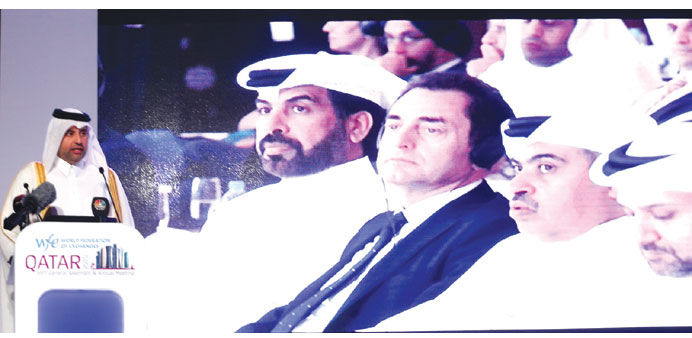HE Sheikh Ahmed addressing the 55th general assembly and annual meeting of World Federation of Exchanges as al-Mansoori, Cordoba, al-Kuwari and Qatar Financial Centre Authority CEO Yousuf al-Jaida listen.
By Santhosh V Perumal
Business Reporter
Strong macroeconomic fundamentals, zero tax regime, attractive valuation and strong future projects make Gulf Cooperation Council (GCC) a strong investment candidate for the world economies to look into the prospects, according to QNB.
Moreover, Saudi Arabia and Kuwait are expected to be upgraded by global index compiler MSCI into ‘emerging’ market, which can also positively influence the GCC bourses, whose combined market capitalisation is nearing $1trn, “nearly as large as Brazil and Russia put together”, QNB chief executive Ali Ahmed al-Kuwari told the 55th general assembly and annual meeting of World Federation of Exchanges (WFE), which began yesterday.
He said the Gulf region has a strong footing with the regional economies expected to grow 3.3% this year but only to marginally slowdown to 2.8% in the subsequent year.
Ever since the MSCI upgrade of Qatar and the UAE to ‘emerging’ market from the earlier ‘frontier’ status; al-Kuwari, who is also the vice-chairman of Qatar Stock Exchange (QSE), said the markets had become attractive for investments, especially for foreign institutions.
The QSE, which has outperformed the other regional bourses in the last five years, is the second largest exchange in the GCC in terms of market capitalisation, he said. The present market capitalisation of the QSE stands at more than QR616bn (as of October 20, 2015).
Earlier addressing the WFE, the Minister of Economy and Commerce HE Sheikh Ahmed bin Jassim bin Mohamed al-Thani said the government has adopted proactive steps through stability of policies, prices and costs for businesses to support the private sector.
In reference to the growing importance of private sector in the country’s economic landscape, he said non-hydrocarbon sector accounts for half of Qatar’s GDP in 2014. “Government is also interested in small and medium enterprises, which are one of the bulwarks of the national economy,” the minister said, adding the vast capital expenditure for the infrastructure development in the country offered immense potential for the private sector.
QSE chief executive Rashid bin Ali al-Mansoori said Qatar is fundamentally strong due to its robust diversification strategies, even as 2014 was not that a rosy year for the world economies due to fall in oil prices.
Highlighting that one of the main factors supporting the Qatari equity market is strong fundamentals of the Qatari economy, he told WFE: “Qatar’s public projects and investments are progressing as planned and will not be impacted by the drop in oil prices in international markets.”
Another factor for having a positive outlook for Qatar’s equity market is the population growth, which will lead to increase demand in government infrastructure projects, he said, adding high public spending rates will fuel both public and private corporates with profitable infrastructure projects.
Additional cash market products are being developed and sophisticated indices have been designed for investors in Qatar and other GCC markets, according to him. “QSE has an ambitious strategy to increase liquidity in the market and attract more local and global investors. We recognise that developing liquidity in the market is important and we continue to develop and introduce initiatives to further enhance the market,” al-Mansoori said. He also said the upgrade to emerging market status by MSCI, Standard & Poor’s, and recently FTSE has led to significant increases in trading activity and market depth.
WFE chairman and chief executive of Bolsa de Valores de Colombia Juan Pablo Cordoba said the slowdown in China has underpinning not only in the equity markets but volatility was also seen in the foreign exchange, commodities and bond markets.

